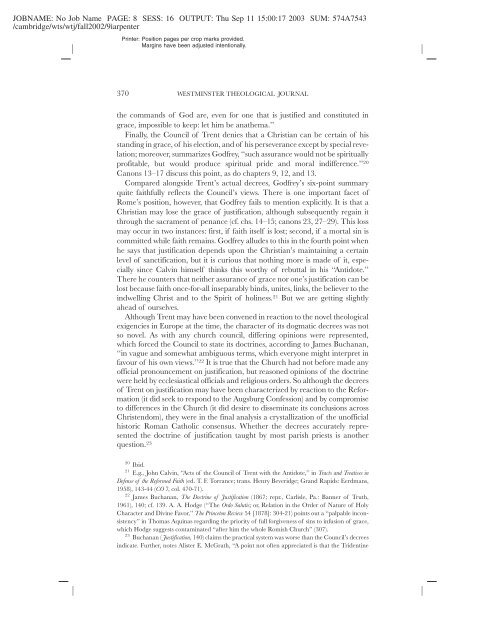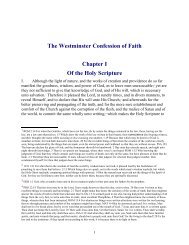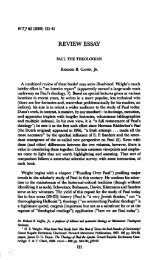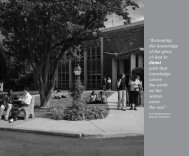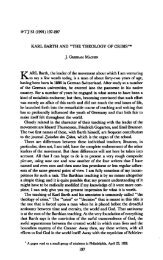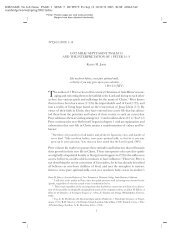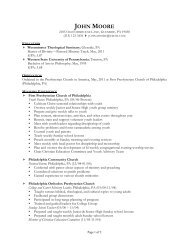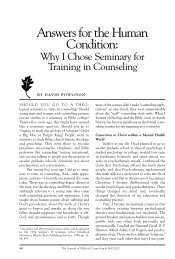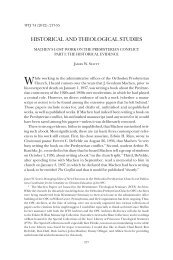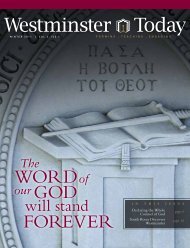A Question of Union with Christ? Calvin and Trent on Justification
A Question of Union with Christ? Calvin and Trent on Justification
A Question of Union with Christ? Calvin and Trent on Justification
Create successful ePaper yourself
Turn your PDF publications into a flip-book with our unique Google optimized e-Paper software.
JOBNAME: No Job Name PAGE: 8 SESS: 16 OUTPUT: Thu Sep 11 15:00:17 2003 SUM: 574A7543<br />
/cambridge/wts/wtj/fall2002/9ìarpenter<br />
Printer: Positi<strong>on</strong> pages per crop marks provided.<br />
Margins have been adjusted intenti<strong>on</strong>ally.<br />
370 WESTMINSTER THEOLOGICAL JOURNAL<br />
the comm<str<strong>on</strong>g>and</str<strong>on</strong>g>s <str<strong>on</strong>g>of</str<strong>on</strong>g> God are, even for <strong>on</strong>e that is justified <str<strong>on</strong>g>and</str<strong>on</strong>g> c<strong>on</strong>stituted in<br />
grace, impossible to keep: let him be anathema.’’<br />
Finally, the Council <str<strong>on</strong>g>of</str<strong>on</strong>g> <str<strong>on</strong>g>Trent</str<strong>on</strong>g> denies that a <str<strong>on</strong>g>Christ</str<strong>on</strong>g>ian can be certain <str<strong>on</strong>g>of</str<strong>on</strong>g> his<br />
st<str<strong>on</strong>g>and</str<strong>on</strong>g>ing in grace, <str<strong>on</strong>g>of</str<strong>on</strong>g> his electi<strong>on</strong>, <str<strong>on</strong>g>and</str<strong>on</strong>g> <str<strong>on</strong>g>of</str<strong>on</strong>g> his perseverance except by special revelati<strong>on</strong>;<br />
moreover, summarizes Godfrey, ‘‘such assurance would not be spiritually<br />
pr<str<strong>on</strong>g>of</str<strong>on</strong>g>itable, but would produce spiritual pride <str<strong>on</strong>g>and</str<strong>on</strong>g> moral indifference.’’ 20<br />
Can<strong>on</strong>s 13–17 discuss this point, as do chapters 9, 12, <str<strong>on</strong>g>and</str<strong>on</strong>g> 13.<br />
Compared al<strong>on</strong>gside <str<strong>on</strong>g>Trent</str<strong>on</strong>g>’s actual decrees, Godfrey’s six-point summary<br />
quite faithfully reflects the Council’s views. There is <strong>on</strong>e important facet <str<strong>on</strong>g>of</str<strong>on</strong>g><br />
Rome’s positi<strong>on</strong>, however, that Godfrey fails to menti<strong>on</strong> explicitly. It is that a<br />
<str<strong>on</strong>g>Christ</str<strong>on</strong>g>ian may lose the grace <str<strong>on</strong>g>of</str<strong>on</strong>g> justificati<strong>on</strong>, although subsequently regain it<br />
through the sacrament <str<strong>on</strong>g>of</str<strong>on</strong>g> penance (cf. chs. 14–15; can<strong>on</strong>s 23, 27–29). This loss<br />
may occur in two instances: first, if faith itself is lost; sec<strong>on</strong>d, if a mortal sin is<br />
committed while faith remains. Godfrey alludes to this in the fourth point when<br />
he says that justificati<strong>on</strong> depends up<strong>on</strong> the <str<strong>on</strong>g>Christ</str<strong>on</strong>g>ian’s maintaining a certain<br />
level <str<strong>on</strong>g>of</str<strong>on</strong>g> sanctificati<strong>on</strong>, but it is curious that nothing more is made <str<strong>on</strong>g>of</str<strong>on</strong>g> it, especially<br />
since <str<strong>on</strong>g>Calvin</str<strong>on</strong>g> himself thinks this worthy <str<strong>on</strong>g>of</str<strong>on</strong>g> rebuttal in his ‘‘Antidote.’’<br />
There he counters that neither assurance <str<strong>on</strong>g>of</str<strong>on</strong>g> grace nor <strong>on</strong>e’s justificati<strong>on</strong> can be<br />
lost because faith <strong>on</strong>ce-for-all inseparably binds, unites, links, the believer to the<br />
indwelling <str<strong>on</strong>g>Christ</str<strong>on</strong>g> <str<strong>on</strong>g>and</str<strong>on</strong>g> to the Spirit <str<strong>on</strong>g>of</str<strong>on</strong>g> holiness. 21 But we are getting slightly<br />
ahead <str<strong>on</strong>g>of</str<strong>on</strong>g> ourselves.<br />
Although <str<strong>on</strong>g>Trent</str<strong>on</strong>g> may have been c<strong>on</strong>vened in reacti<strong>on</strong> to the novel theological<br />
exigencies in Europe at the time, the character <str<strong>on</strong>g>of</str<strong>on</strong>g> its dogmatic decrees was not<br />
so novel. As <str<strong>on</strong>g>with</str<strong>on</strong>g> any church council, differing opini<strong>on</strong>s were represented,<br />
which forced the Council to state its doctrines, according to James Buchanan,<br />
‘‘in vague <str<strong>on</strong>g>and</str<strong>on</strong>g> somewhat ambiguous terms, which every<strong>on</strong>e might interpret in<br />
favour <str<strong>on</strong>g>of</str<strong>on</strong>g> his own views.’’ 22 It is true that the Church had not before made any<br />
<str<strong>on</strong>g>of</str<strong>on</strong>g>ficial pr<strong>on</strong>ouncement <strong>on</strong> justificati<strong>on</strong>, but reas<strong>on</strong>ed opini<strong>on</strong>s <str<strong>on</strong>g>of</str<strong>on</strong>g> the doctrine<br />
were held by ecclesiastical <str<strong>on</strong>g>of</str<strong>on</strong>g>ficials <str<strong>on</strong>g>and</str<strong>on</strong>g> religious orders. So although the decrees<br />
<str<strong>on</strong>g>of</str<strong>on</strong>g> <str<strong>on</strong>g>Trent</str<strong>on</strong>g> <strong>on</strong> justificati<strong>on</strong> may have been characterized by reacti<strong>on</strong> to the Reformati<strong>on</strong><br />
(it did seek to resp<strong>on</strong>d to the Augsburg C<strong>on</strong>fessi<strong>on</strong>) <str<strong>on</strong>g>and</str<strong>on</strong>g> by compromise<br />
to differences in the Church (it did desire to disseminate its c<strong>on</strong>clusi<strong>on</strong>s across<br />
<str<strong>on</strong>g>Christ</str<strong>on</strong>g>endom), they were in the final analysis a crystallizati<strong>on</strong> <str<strong>on</strong>g>of</str<strong>on</strong>g> the un<str<strong>on</strong>g>of</str<strong>on</strong>g>ficial<br />
historic Roman Catholic c<strong>on</strong>sensus. Whether the decrees accurately represented<br />
the doctrine <str<strong>on</strong>g>of</str<strong>on</strong>g> justificati<strong>on</strong> taught by most parish priests is another<br />
questi<strong>on</strong>. 23<br />
20 Ibid.<br />
21 E.g., John <str<strong>on</strong>g>Calvin</str<strong>on</strong>g>, ‘‘Acts <str<strong>on</strong>g>of</str<strong>on</strong>g> the Council <str<strong>on</strong>g>of</str<strong>on</strong>g> <str<strong>on</strong>g>Trent</str<strong>on</strong>g> <str<strong>on</strong>g>with</str<strong>on</strong>g> the Antidote,’’ in Tracts <str<strong>on</strong>g>and</str<strong>on</strong>g> Treatises in<br />
Defense <str<strong>on</strong>g>of</str<strong>on</strong>g> the Reformed Faith (ed. T. F. Torrance; trans. Henry Beveridge; Gr<str<strong>on</strong>g>and</str<strong>on</strong>g> Rapids: Eerdmans,<br />
1958), 143-44 (CO 7, col. 470-71).<br />
22 James Buchanan, The Doctrine <str<strong>on</strong>g>of</str<strong>on</strong>g> Justificati<strong>on</strong> (1867; repr., Carlisle, Pa.: Banner <str<strong>on</strong>g>of</str<strong>on</strong>g> Truth,<br />
1961), 140; cf. 139. A. A. Hodge (‘‘The Ordo Salutis; or, Relati<strong>on</strong> in the Order <str<strong>on</strong>g>of</str<strong>on</strong>g> Nature <str<strong>on</strong>g>of</str<strong>on</strong>g> Holy<br />
Character <str<strong>on</strong>g>and</str<strong>on</strong>g> Divine Favor,’’ The Princet<strong>on</strong> Review 54 [1878]: 304-21) points out a ‘‘palpable inc<strong>on</strong>sistency’’<br />
in Thomas Aquinas regarding the priority <str<strong>on</strong>g>of</str<strong>on</strong>g> full forgiveness <str<strong>on</strong>g>of</str<strong>on</strong>g> sins to infusi<strong>on</strong> <str<strong>on</strong>g>of</str<strong>on</strong>g> grace,<br />
which Hodge suggests c<strong>on</strong>taminated ‘‘after him the whole Romish Church’’ (307).<br />
23 Buchanan ( Justificati<strong>on</strong>, 140) claims the practical system was worse than the Council’s decrees<br />
indicate. Further, notes Alister E. McGrath, ‘‘A point not <str<strong>on</strong>g>of</str<strong>on</strong>g>ten appreciated is that the Tridentine


